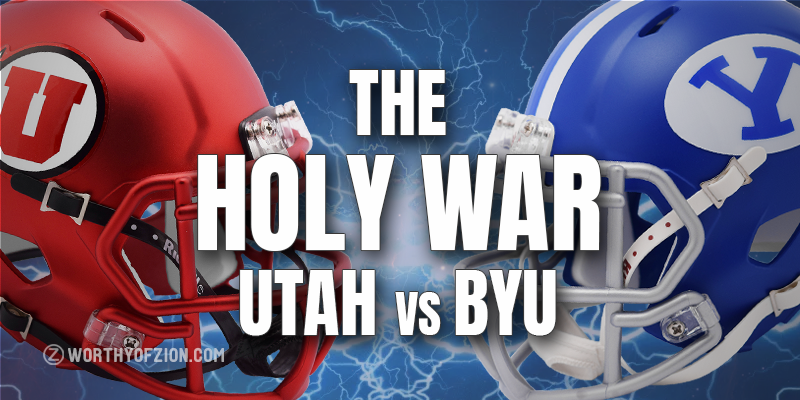Today is the day. The Utah Utes are playing the undefeated BYU Cougars. Honestly, it could go either way. Utah could win and knock BYU out of its top 10 ranking, currently ranked number 9. Or, BYU’s Cinderella season could continue.
Today on ESPN.com Reigniting one of college football’s best rivalries in BYU vs. Utah – ESPN – Blizzards, cheerleader fights, the ‘Answered Prayer’ and more as BYU-Utah returns
Where did the conflict between Utah and BYU begin? Both schools were founded by the prophet Brigham Young. One became a church school, the other a state school. BYU represents the values of the church, while Utah locally appears to represent the antithesis of those values. And thus, the Holy War.
In reality, this isn’t 100% true. Many faithful members of the LDS Church attend both schools, and many of the Church’s prophets and apostles, including Thomas S. Monson, Russell M. Nelson, and others, attended Utah. Both institutions are excellent places of education. But the good vs. evil rivalry is fun.
Shortly after settlers from The Church of Jesus Christ of Latter-day Saints began arriving in the Salt Lake Valley in 1847, leader Brigham Young organized a board of regents to establish a university. On Feb. 28, 1850, the General Assembly of the provisional State of Deseret founded what is now the University of Utah.
A brief history of U’s relationship with the LDS Church – @theU
Brigham Young University (BYU) is a private research university in Provo, Utah, United States. It was founded in 1875 by religious leader Brigham Young and is sponsored by the Church of Jesus Christ of Latter-day Saints (LDS Church).
Brigham Young University – Wikipedia
There has been a bit of a “saints and sinners” stigma assigned to both schools by their fan bases. If you can’t abide by BYU’s honor code, you can always go to Utah. Though Utah is far from being on the list of top-ranked party schools nationally, it is probably the #1 party school in Utah. BYU, on the other hand, is recognized for—and proud of—being stone-cold sober. This means people are quick to notice when BYU students, fans, or athletes don’t uphold their standards.
I feel as though I have some history with both schools. Both my parents graduated from BYU, so naturally, I grew up being taught to cheer for my father’s team. I remember attending a few games and even recall my father dragging me to San Diego for the Holiday Bowl a few times. That seemed to be the only bowl game the BYU Cougars were ever in. A quick check shows that, while I was growing up, BYU played in the Holiday Bowl 10 times between 1987 and 1991: [Wikipedia: 78, 79, 80, 81, 82, 83, 84, 89, 90, 91]. If I think back, I can remember the game I attended:
- Sitting next to people drinking beer
- A quarterback breaking his ribs
- A big game where BYU won
- A long drive home in the middle of the night in a caravan of other BYU fans
Somewhere in the ’90s, I started rooting for Utah. I married into a family of hardcore Utah fans. My father-in-law grew up in Utah and was an adult convert to the Church. Naturally, he grew up liking Utah and disliking BYU.
Around the time I got married, my brother also became a Utah Yell Leader. I went to see him practice a few times, but I never saw a game he cheered in. I was amazed at how strong he had to be and how much talent it took to do what he did. I think it was because of him that I actually started rooting for Utah. An incident happened between him and a fan the day after I got married. The way BYU administrators and the fan base treated him was disgusting and appalling. It was at that point that I couldn’t have cared less about BYU for many years. I know that is a little cryptic, but if you know, you know.
Today, I’ve softened a bit. I like to see the players succeed. The sister of one of my neighbors married a young BYU star named Curtis Brown. He was incredibly talented. We were good friends with the family, and they would tell us about the challenges and sacrifices Curtis had to make in order to chase his dream of going professional. Even though I never got to know Curtis very well, I came to understand who he was and the kind of character he had. I have nothing but respect for Curtis. It has been people like him who have made me hope for the success of the individual.
Today, I’m more of a fence-sitter. I just want to see them play their best. If it is BYU’s destiny to succeed, I hope they do. I want to see them rise to the occasion, displaying the best honor and character. And if it is Utah’s destiny to disrupt BYU and bring them down to earth, I hope they do so respectfully. It is times like this when your true character shines—or doesn’t shine.
Today, my neighbor Nate Richie plays for Utah. I hope he does well today.
In BYU’s defense, there have been some great stories lately about the character of their players. These are the types of stories I like to see—young men standing out. And the stories about Jake Retzlaff. I wish him well also.
